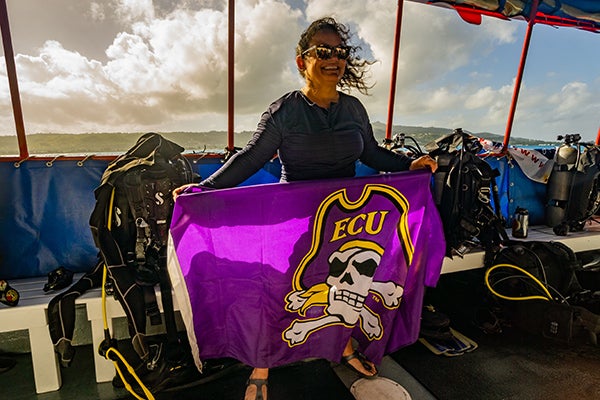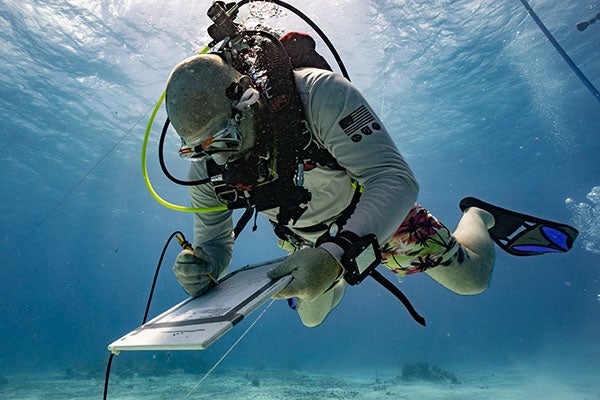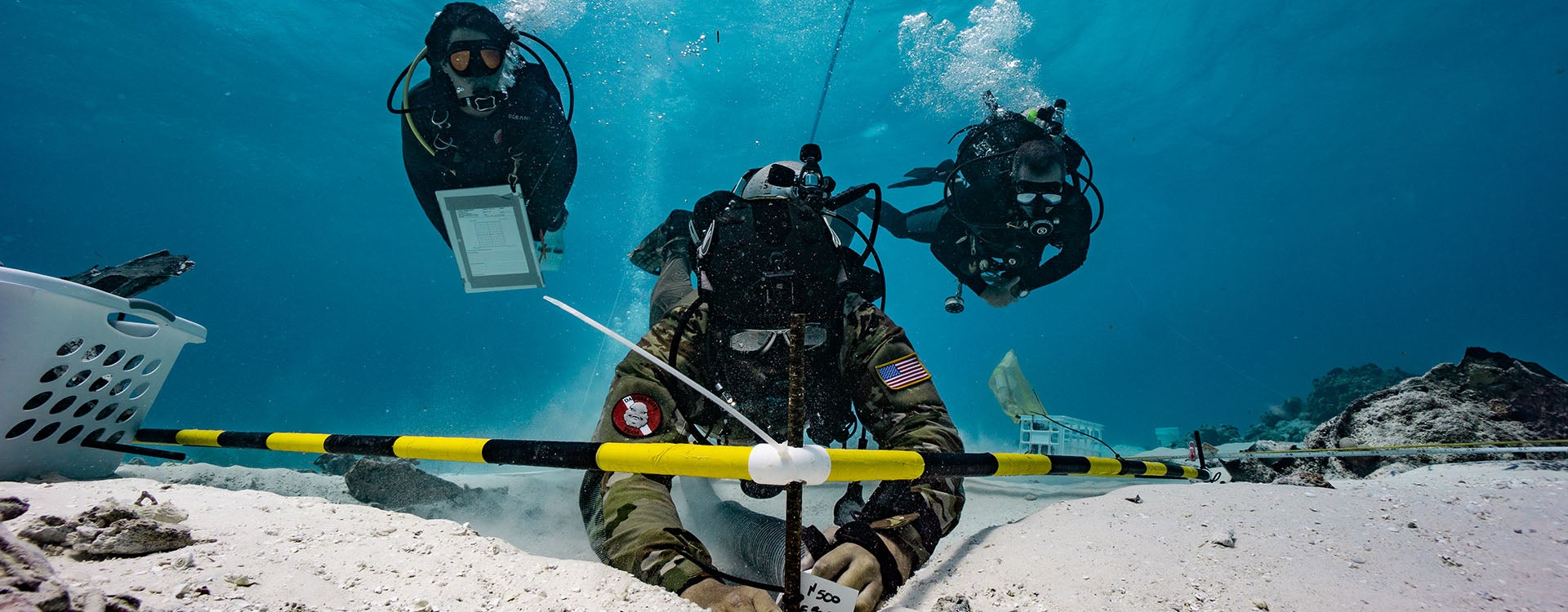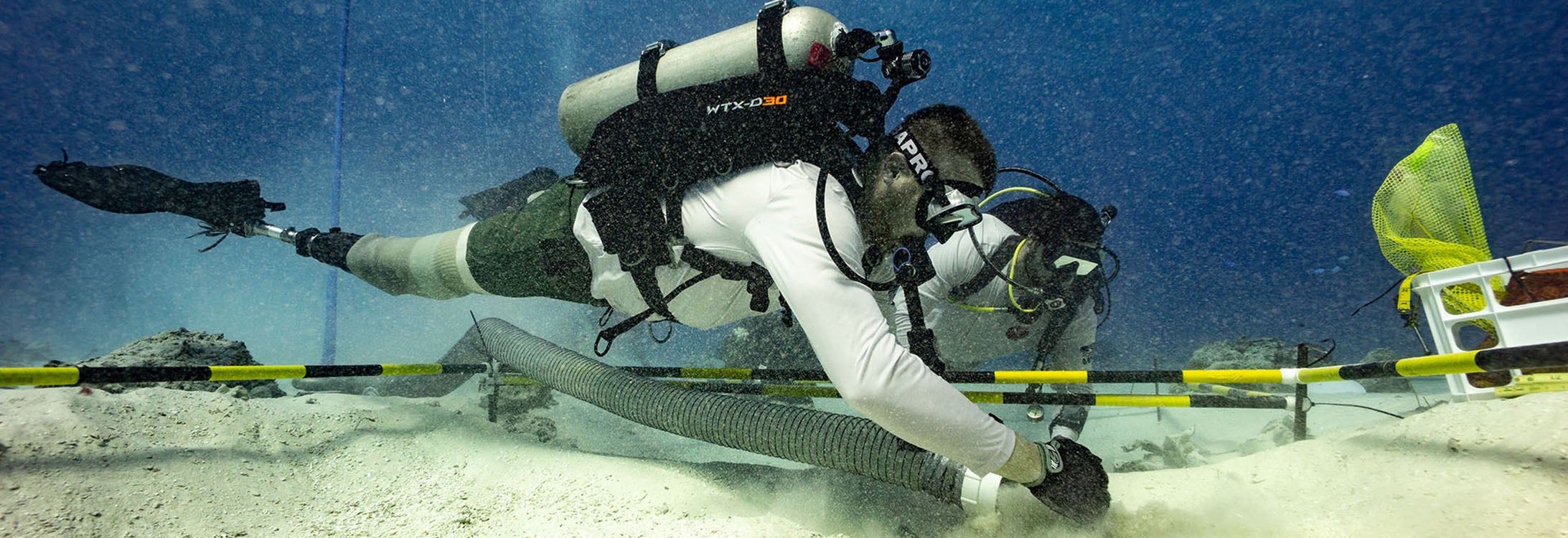DIVE THERAPY AND RECOVERY
Veterans, ECU maritime researchers search for missing WWII personnel
East Carolina University researchers continue to search for and recover missing aircraft and WWII personnel off the coast of Saipan through a project led by Thomas Harriot College of Arts and Sciences associate professor Dr. Jennifer McKinnon.
In June 1944, United States forces launched an amphibious assault on the island of Saipan. During that assault, 22 F6F-3 Hellcat aircraft were lost. Three — possibly four — of those aircraft went down near Tanapag Harbor and the aircraft and pilots remain unaccounted for.
In March, McKinnon, an associate professor in the Department of History and underwater archaeologist in the Program in Maritime Studies, traveled to Saipan to lead a team of archeologists, divers, students and other specialists from around the U.S. in an effort to locate, identify and return missing pilots to their families. They collected samples of sediment and environmental DNA (eDNA) from seven, 2-by-2-meter squares, 50 centimeters deep, from the sites of three aircraft wrecks. Evaluation of the eDNA will indicate if the sediment contained human remains.
“It’s humbling to think we can play a small part in this important mission and potentially help bring closure to the families of missing service personnel,” said McKinnon, who has been working on recovery projects in Saipan for 15 years, describing the work as some of the most meaningful archaeology she has done so far.
McKinnon’s team, run in partnership with the Defense POW/MIA Accounting Agency (DPAA), consisted of underwater archeologists from the Florida Public Archaeology Network at the University of West Florida and the nonprofit organization Ships of Discovery.
The team also provided a uniquely therapeutic, bonding experience for veterans and a group of former U.S. Special Operations Forces members from the Task Force Dagger Special Forces Foundation (TFDF). The foundation provides rehabilitative therapy programs for former soldiers and their families. They partnered with ECU in 2017 when McKinnon was introduced to the foundation by current ECU maritime studies graduate student and retired U.S. Army Staff Sgt. Pat Smith.
Smith started his career in the U.S. Army Reserves in December 2002 in Wilmington, Delaware, before joining active duty as a paratrooper with the 82nd Airborne Division at Fort Bragg. He later trained as a psychological operations sergeant at the U.S. Army John F. Kennedy Special Warfare Center and School.
Smith was assigned to various special forces commands, serving in tactical psychological roles, in the Afghanistan War and military operations in Southeast Asia. Due to an injury sustained in combat in Afghanistan, Smith medically retired in March 2015.

ECU associate professor Dr. Jennifer McKinnon waves an ECU flag on a boat during a research trip to Saipan.

ECU maritime studies graduate student and retired U.S. Army Staff Sgt. Pat Smith completes a unit data recording form.
“Task Force Dagger Foundation keeps an eye out for wounded/chronically ill/injured transitioning service members to civilian life through the United States Special Operations Command Care Coalition and tries to assist them as needed. They invited me to participate in one of their scuba diving events for disabled service members and veterans in 2016, where I obtained my advanced scuba diving certification,” Smith said. “One of their members, retired Master Sgt. Mark Stephens, encouraged me to continue educational pursuits that involved diving.”
It was at that point that Smith decided to begin coursework in the maritime studies program at ECU, which he plans to complete this fall.
During the project, McKinnon and other ECU maritime studies faculty and staff trained the veterans on underwater archaeology techniques and skills. Then, veterans and members of the TFDF and DPAA performed the data collection under McKinnon’s supervision.
“For some, diving helps give back their sense of movement,” said McKinnon. “The veterans learn teaching skills. They get a peer-to-peer experience, and coming together makes them feel like a team again.”
“The experience was wonderful,” Smith said. “There is a great deal of comradeship, and it was a perfect fusion of people with can-do attitudes that will not accept an answer of ‘I can’t’ when it comes to solving problems or accomplishing a mission.
“It was a privilege to work with top scientists in the field of maritime archaeology, the DPAA and some of the best service members that the U.S. military has ever produced,” he said. “I don’t believe the level of organizational process or logistics demonstrated by the team could be achieved by another entity at the same level of efficiency and professionalism demonstrated by the joint team of ECU, the Florida Public Archaeology Network, DPAA, TFDF and the support of the people of Saipan.”
Smith also said he felt the opportunity was a way to continue to serve the U.S. by bringing “some semblance of relief to Gold Star families — that have a relative that is still missing in action or unaccounted for — knowing that someone is still looking for their loved ones.”
For McKinnon and ECU, this was the sixth collaborative mission with the DPAA and the third with TFDF. The next step of the project includes reporting on the results of the eDNA data collection and the success of the innovation of the programming with veterans. This fall, McKinnon will provide training in remote sensing techniques that the group may use in its continued research.

Task Force Dagger Foundation board chairman Mark Stephens excavates a corner of the unit while doctoral ECU student Dominic Bush overseas the process.
Related
Veterans and archaeologists search for missing WWII personnel
Can environmental DNA help us find lost US service members?
